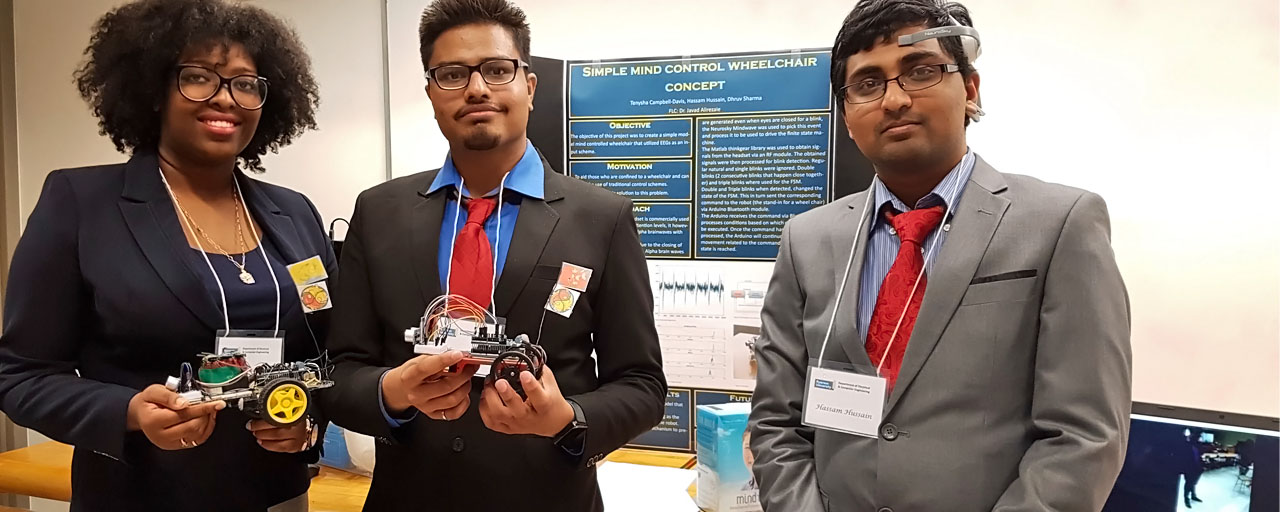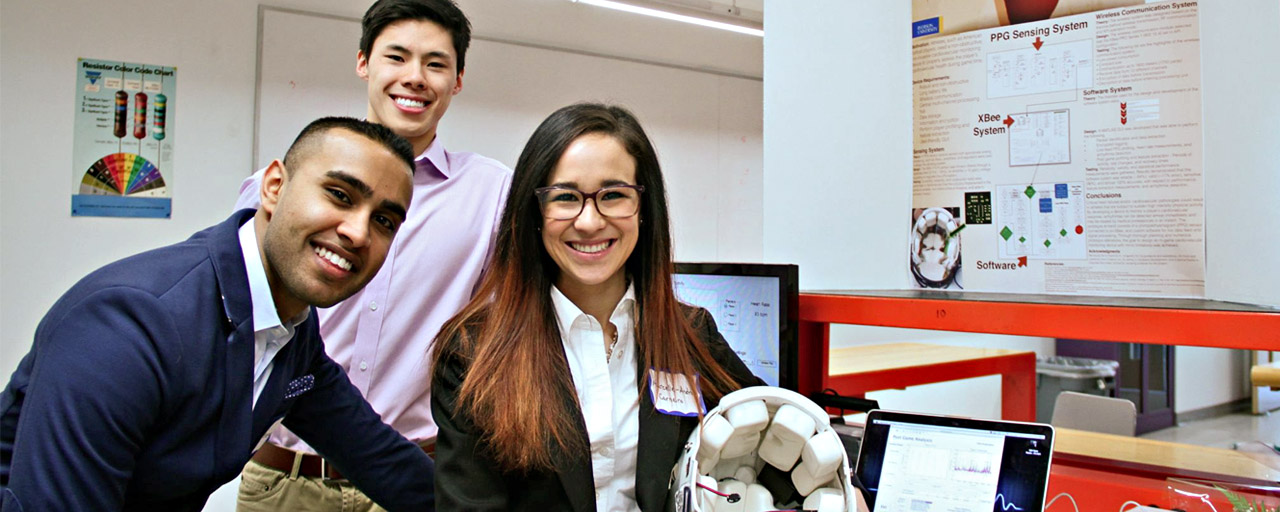UNDERGRADUATE PROGRAM
Course Selection
Student Academic FAQ
B.Eng. in Electrical Engineering
Tell me more
Graduates find employment involving research and development,
production engineering and quality control, in a wide range of areas such as
electronic design, multimedia, communication, power systems, health care, computer
system design and information systems.
B.Eng. in Biomedical Engineering
Tell me more
TMU's Biomedical Engineering program is one of the first standalone undergraduate
Biomedical Engineering programs in Canada. The program takes advantage of the
strategic location of Toronto Metropolitan University in Toronto's Medical Discovery
District and seven world-class hospitals.
B.Eng. in Computer Engineering
Tell me more
Computer engineers distinguish themselves with their versatile
set of skills: they can design and build computers, interface them with the outside
world and make them talk to each other, develop firmware and also create
system-level and user/application-level software.
Co-operative Internship
Tell me more
The Co-operative Internship Program provides full-time
undergraduate students who have successfully completed three years of the Electrical
or Computer Engineering program with the opportunity to obtain valuable, on-the-job
training and work experience over a eight, twelve or sixteen consecutive month paid
work-term in a company or organization.
Doctor of Philosophy
Tell me more
The program leading to the degree of Doctor of Philosophy
(PhD) provides an opportunity for the full-time student to pursue advanced research.
The PhD program requires a minimum of four one-term courses and a research seminar,
the successful completion of the Candidacy Examination and, a major research thesis
which is expected to be an original and significant contribution to knowledge in the
discipline, and the successful defence of the research thesis. The minimum residency
of PhD is 24 months and the maximum length of time to complete doctoral studies is 6
calendar years.
Master of Applied Science
Tell me more
The program leading to the degree of Master of Applied
Science (MASc) provides an opportunity for the full-time student to pursue advance
studies in a specific field of interest and an opportunity to engage in research and
engineering design. The MASc program consists of five one-term courses, a research
seminar, a research thesis, and the successful defence of the research thesis. The
minimum residency of MASc is 12 months and the maximum length of time to complete
MASc is 3 calendar years.
Master of Engineering
Tell me more
The program leading to the degree of Master of Engineering
(MEng) is intended to provide an opportunity for advanced study, primarily on a
part-time basis, which leans more to design and engineering practice than to
research. The MEng program requires the successful completion of ten one-term
courses or eight one-term courses and a research project. The minimum residency of
full-time MEng is 12 months and the maximum length of time to complete full-time
MEng is 3 calendar years. The minimum residency of part-time MEng is 24 months and
the maximum length of time to complete part-time MEng is 5 calendar years.
Master of Engineering with AI Concentration
Tell me more
A master’s degree (MEng) in Electrical and Computer
Engineering with an AI concentration will provide students with the technical
training and ethical awareness they need to be successful professionals in the AI
field.
International Double Degree
Tell me more
The Department of Electrical, Computer, And Biomedical
Engineering offers its students the opportunity to pursue a recognized graduate
program at Toronto Metropolitan University as well as at one of our partner
universities in Europe. Following the objectives and spirit of Toronto Metropolitan
University's priorities in trans-atlantic collaboration in higher professional
education, the participating students will spend one year each at TMU and at the
partner institution during the normal two year period of the program.Following the successful completion of their degree requirements at both universities, the students will receive two Master's degrees, one from Toronto Metropolitan University and the other from the partner university. All of the graduate courses offered at our international partner universities are delivered in English.
Master of Engineering in Computer Networks
Tell me
more
The Master of Engineering (MEng) in Computer Networks is a
one-year full-time, or a two-year part-time master depending on the qualification
demand and the job market at the time, students may be able to step into computer
network related employment upon graduation. The program also provides the basis for
graduates to take on advanced responsibilities, enabling them to capitalize on their
individual backgrounds, and advance in Computer Network careers in areas related to
their particular strength and interests.Students in the program learn the practical aspects of Computer Networks in the laboratory established from a generous equipment donation from CISCO Systems Canada. The laboratory houses numerous switches, routers, and equipment on network security, wireless network and voice over IP.
Energy and Innovation Professional Master's
Diploma
Tell me more
The Professional Master's Diploma in Energy and Innovation
is intended to provide participants with the knowledge and skills required to
function competently as officers, administrators, technicians, analysts, etc. in the
field of Energy. Those wishing to seek external certification in Energy should be
well advanced along this path as well.In addition to providing diverse, meaningful and lucrative career options to participants, the diploma program addresses recognized and pressing needs within the public and private sectors, for individuals qualified in these areas to assume a variety of operational, administrative and managerial roles. Representative job titles might include Energy Analyst, Energy Policy Advisor and Energy Manager.


